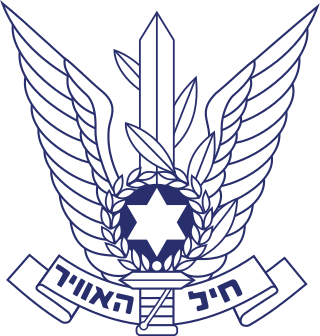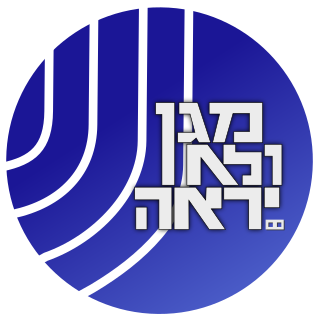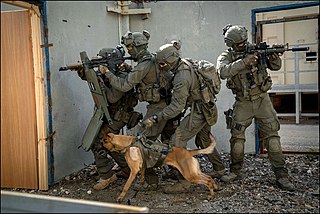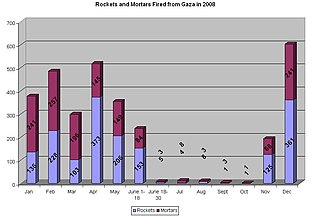Special forces units in the Israel Defense Forces encompass a broad definition of specialist units. Such units are usually a regiment or a battalion in strength.

The Israeli Air Force operates as the aerial and space warfare branch of the Israel Defense Forces (IDF). It was founded on May 28, 1948, shortly after the Israeli Declaration of Independence. As of April 2022, Aluf Tomer Bar has been serving as the Air Force commander.
Fedayeen[note A] is an Arabic term used to refer to various military groups willing to sacrifice themselves for a larger campaign.

The Israel Security Agency, better known by the acronyms Shabak or Shin Bet, is Israel's internal security service. Its motto is "Magen v'lo Yera'eh". The Shin Bet's headquarters are located in northwest Tel Aviv, north of Yarkon Park.

The Israel Border Police is the gendarmerie and border security branch of the Israel National Police. It is also commonly known by its Hebrew abbreviation Magav, meaning border guard; its members are colloquially known as magavnikim. "Border Guard" is often used as the official name of the Israel Border Police in English. While its main task is securing Israel's borders, it has also been deployed to assist the Israel Defense Forces, and for counter-terrorism and law enforcement operations in the Israeli-occupied West Bank and in Jerusalem.

The 84th "Givati" Brigade is an Israel Defense Forces infantry brigade formed in 1947.

Yamam, also known as National Counter-Terrorism Unit, is Israel's national counter-terrorism unit, one of four special units of the Israel Border Police. The Yamam is capable of both hostage-rescue operations and offensive take-over raids against terrorist targets in civilian areas. Besides military and counter-terrorism duties, it also performs tactical unit duties and undercover police work.

The Popular Resistance Committees is a coalition of a number of armed Palestinian groups opposed to what they regard as the conciliatory approach of the Palestinian Authority and Fatah towards Israel.

The Yasin, also known as Yassin, or Al-Yassin, is an anti-tank weapon derived from the RPG-7 produced by the Izz ad-Din al-Qassam Brigades, the military wing of Hamas, and first deployed in 2004. It was named after Hamas' spiritual leader, Sheikh Ahmed Yasin, killed by the Israel Defense Forces (IDF) on March 22, 2004.

Palestinian political violence refers to acts of violence or terrorism committed by Palestinians with the intent to accomplish political goals, and often carried out in the context of the Israeli–Palestinian conflict. Common objectives of political violence by Palestinian groups include self-determination in and sovereignty over all of the region of Palestine, or the recognition of a Palestinian state inside the 1967 borders. This includes the objective of ending the Israeli occupation. More limited goals include the release of Palestinian prisoners held by Israel and recognition of the Palestinian right of return.

Samson's Foxes was an Israeli commando unit of the 1948 Arab–Israeli War. It was part of the 54th Battalion of the Givati Brigade. The unit participated in various battles on the southern front, including Operation GYS and the Battles of the Separation Corridor.

The 900th "Kfir" Brigade, is the youngest and largest infantry brigade of the Israel Defense Forces. It is subordinate to the 99th "Flash" Infantry Division (Reserve) of Israel's Central Regional Command.
Mista‘arvim, also spelled mista‘aravim, is the name given to certain units in the Israel Defense Forces, Israel Border Police, and Israel Police that assimilate into local Arab populations to operate undercover while gathering intelligence or conducting law enforcement, hostage rescue, and counter-terrorism operations.

Shayetet 13 is a naval commando unit of the Israeli Navy and one of the primary reconnaissance units of the Israel Defense Forces. Shayetet 13 specializes in sea-to-land incursions, counter-terrorism, sabotage, maritime intelligence gathering, maritime hostage rescue, and boarding. The unit is trained for sea, air and land actions. The unit has taken part in almost all of Israel's major wars, as well as other actions.

Unit 5101, more commonly known as Shaldag, is one of the premier Israeli Air Force (IAF) Sayeret units. The unit is part of the 7th Special Air Forces Wing and is based in the Palmachim Airbase. The unit is led by an officer at the rank of lieutenant colonel.

In 2008 the Israel Defense Forces launched Operation Hot Winter, also called Operation Warm Winter, in the Gaza Strip, starting on February 29, 2008 in response to Qassam rockets fired from the Strip by Hamas onto Israeli civilians. At least 112 Palestinians, along with three Israelis, were killed, and more than 150 Palestinians and seven Israelis were injured.

The 2008 Israel–Hamas ceasefire was an Egyptian-brokered six-month Tahdia "for the Gaza area", which went into effect between Hamas and Israel on 19 June 2008. According to the Egyptian-brokered agreement, Israel promised to stop air strikes and other attacks, while in return, there would not be rocket attacks on Israel from Gaza. Once the ceasefire held, Israel was to gradually begin to ease its blockade of Gaza.

Reprisal operations were raids carried out by the Israel Defense Forces in the 1950s and 1960s in response to frequent fedayeen attacks during which armed Arab militants infiltrated Israel from Syria, Egypt, and Jordan to carry out attacks on Israeli civilians and soldiers. Most of the reprisal operations followed raids that resulted in Israeli fatalities. The goal of these operations – from the perspective of Israeli officials – was to create deterrence and prevent future attacks. Two other factors behind the raids were restoring public morale and training newly formed army units. A number of these operations involved attacking villages and Palestinian civilians in the West Bank, including the 1953 Qibya massacre.
The murder of the Aroyo children was a terrorist attack which occurred on 2 January 1971, in which two Israeli children were killed when Palestinian militants threw a hand grenade into the moving car of the Aroyo family which was touring the Gaza Strip. The attack was a turning point in the way Israel began relating towards terrorist threats originating from the Gaza Strip. Following the attack Israel launched an extensive counter-terror operation in the Gaza Strip.

The Palestinian Fedayeen insurgency was an armed cross-border conflict, which peaked between 1949 and 1956, involving Israel and Palestinian militants, mainly based in the Gaza Strip, under the nominal control of the All-Palestine Protectorate – a Palestinian client-state of Egypt declared in October 1948, which became the focal point of the Palestinian fedayeen activity. Hundreds were killed in the course of the conflict, which declined after the 1956 Suez Crisis.

















